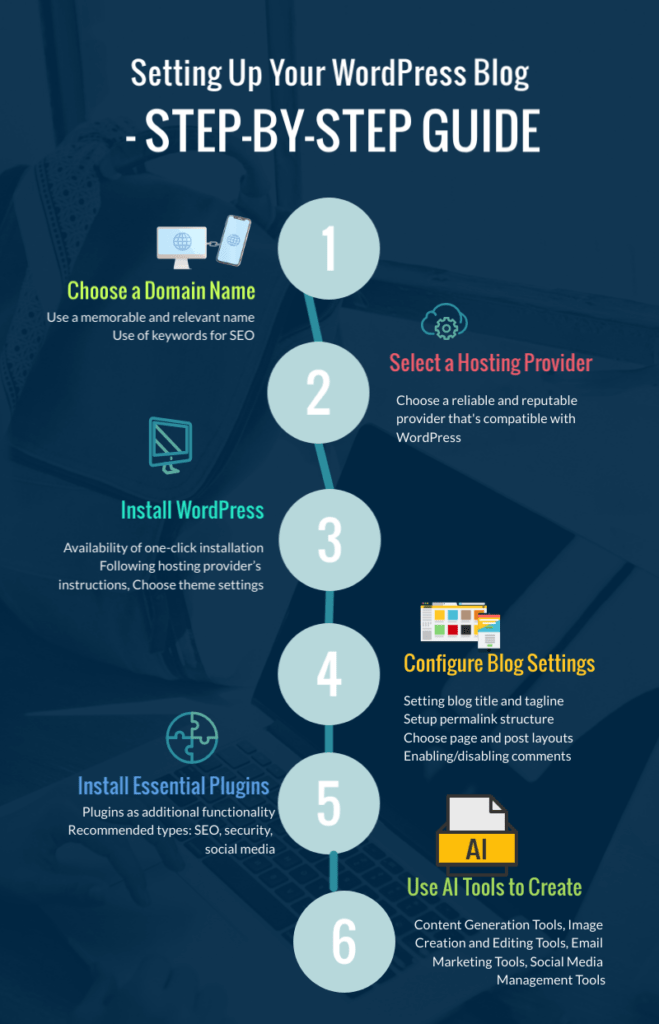Blogging has become an incredibly popular way for individuals to express their thoughts, share their expertise, and even make a living. With the rise of platforms like WordPress, starting a blog has become easier than ever. Whether you want to start a personal blog or turn your passion into profit, WordPress provides the perfect foundation for your online presence.
Choosing the Right Blogging Platform – Why WordPress?
When it comes to blogging platforms, WordPress is the clear winner. It offers a user-friendly interface, powerful features, and endless customization options. With WordPress, you have full control over your blog’s design, functionality, and content. It’s also SEO-friendly, meaning your blog has a better chance of ranking higher in search engine results. Additionally, WordPress offers a vast library of themes and plugins, allowing you to create a unique and professional-looking blog without any coding knowledge.
Setting Up Your WordPress Blog – Step-by-Step Guide
 Now that you’ve decided to start a blog on WordPress, it’s time to get things set up. Follow these simple steps to lay the foundation for your successful blog:
Now that you’ve decided to start a blog on WordPress, it’s time to get things set up. Follow these simple steps to lay the foundation for your successful blog:- Choose a domain name: Your domain name is your blog’s address on the internet. It should be memorable, relevant to your niche, and easy to spell.
- Purchase web hosting: Web hosting is like renting space on the internet for your blog. Look for a reliable hosting provider that offers good speed and uptime.
- Install WordPress: Most hosting providers have a one-click installation option for WordPress. Follow the instructions to get WordPress up and running on your domain.
- Set up your blog’s basic settings: Customize your blog’s title, tagline, and permalink structure. These settings can be found in the WordPress dashboard under “Settings.”
- Choose a theme: WordPress offers thousands of free and premium themes. Browse through the options and choose a theme that aligns with your blog’s topic and aesthetics.
Customizing Your Blog’s Appearance – Themes and Plugins
One of the great advantages of WordPress is the ability to customize your blog’s appearance with themes and plugins. Themes control the overall design and layout of your blog, while plugins add additional functionality. Here are some tips to customize your blog:
- Choose a responsive theme: A responsive theme ensures that your blog looks great on all devices, including smartphones and tablets.
- Customize the theme’s colors and fonts: Many themes allow you to change the colors and fonts to match your branding or personal preferences.
- Install essential plugins: Plugins enhance the functionality of your blog. Some essential plugins include an SEO plugin, a caching plugin for faster loading times, and a social sharing plugin to encourage readers to share your content.
Creating Compelling Content – Finding Your Niche and Target Audience
The success of your blog relies heavily on the content you create. To capture the attention of your audience and keep them coming back for more, follow these guidelines:
- Find your niche: Identify a specific topic or area of expertise that you are passionate about. This will help you stand out from the crowd and attract a targeted audience.
- Research your target audience: Understand who your ideal readers are. What are their interests, pain points, and needs? Tailor your content to provide value and solutions to their problems.
- Create valuable and engaging content: Your content should be informative, entertaining, and well-written. Use a mix of text, images, and videos to keep your readers engaged. Write at least 5 – 10 articles for each category. (The more, the better).
Optimizing Your Blog for Search Engines – SEO Basics
To ensure your blog gets noticed by search engines and ranks higher in search results, you need to optimize it for SEO. Here are some basic SEO tips:
- Use relevant keywords: Research and include keywords related to your blog’s topic in your content, headings, and meta tags.
- Write descriptive meta tags and titles: Meta tags and titles provide a summary of your content to search engines. Make them compelling and include relevant keywords.
- Build quality backlinks: Backlinks from reputable websites signal to search engines that your blog is trustworthy and authoritative. Reach out to other bloggers or website owners in your niche to request backlinks.
Monetizing Your Blog – Different Ways to Make Money
Turning your blog into a profitable venture requires strategic monetization. Here are some popular methods to make money from your blog:
- Display advertising: Join an advertising network, such as Google AdSense, and display ads on your blog. You earn money whenever visitors click on the ads.
- Affiliate marketing: Promote products or services through affiliate links on your blog. When a reader makes a purchase through your link, you earn a commission.
- Sponsored posts: Collaborate with brands and write sponsored content that promotes their products or services. Make sure to disclose sponsored posts to maintain transparency with your readers.
Building an Audience and Driving Traffic to Your Blog
Building an audience is crucial for the success of your blog. Here are some effective strategies to grow your readership and drive traffic:
- Produce high-quality content consistently: Regularly publish valuable and well-crafted content to keep your audience engaged and coming back for more.
- Engage with your readers: Respond to comments on your blog and engage with your audience on social media. Building a community around your blog helps foster loyalty and encourages word-of-mouth promotion.
- Guest blogging: Write guest posts for other blogs in your niche. This exposes your blog to a new audience and can drive traffic back to your site.
Promoting Your Blog on Social Media Platforms
Social media is a powerful tool for promoting your blog and reaching a wider audience. Here’s how to effectively promote your blog on social media:
- Choose the right platforms: Identify which social media platforms your target audience frequents the most. Focus your efforts on those platforms.
- Create engaging content: Tailor your content to each social media platform. Use eye-catching visuals and compelling captions to grab attention.
- Interact with your followers: Respond to comments, ask questions, and participate in discussions. Engaging with your followers helps build a loyal community.
Tracking and Measuring Your Blog’s Success – Analytics Tools
To understand how well your blog is performing and make data-driven decisions, you need to track and measure its success. Here are some essential analytics tools for bloggers:
- Google Analytics: This free tool provides in-depth insights into your blog’s traffic, audience demographics, and user behavior.
- SEO tools: Tools like Moz or SEMrush help you monitor your blog’s SEO performance, track keyword rankings, and identify areas for improvement.
- Social media analytics: Platforms like Facebook, Twitter, and Instagram offer built-in analytics tools to track the performance of your social media posts.
Mistakes to Avoid When Starting a WordPress Blog
Starting a WordPress blog can be exciting, but it’s essential to avoid common mistakes that can hinder your progress. Here are some mistakes to avoid:
- Neglecting regular backups: Always backup your blog’s data to avoid any potential loss.
- Ignoring security measures: Install security plugins and keep WordPress and your plugins updated to protect your blog from hackers.
- Overloading your blog with plugins: While plugins add functionality, too many can slow down your blog’s performance.
Resources and Additional Tools for Successful Blogging
To further enhance your blogging journey, here are some additional resources and tools worth exploring:
- Blogging communities and forums: Join online communities likeBloggingPro orProBlogger to connect with other bloggers, share ideas, and learn from experts.
- Content creation tools: Tools like Grammarly or Hemingway Editor help improve your writing by identifying grammar and readability issues.
- Email marketing platforms: Building an email list is crucial for nurturing your audience. Platforms like Brevo, Mailchimp or ConvertKit can help you manage and automate your email campaigns.
Conclusion
Starting a WordPress blog is an exciting endeavor that can turn your passion into profit. I’ve always enjoyed writing. Blogging helps me tap into a world of creative thought. By following the steps outlined in this ultimate guide, you’ll be equipped with the knowledge and tools to launch a successful blog.
Remember, building a profitable blog takes time, dedication, and consistent effort. Keep learning, experimenting, and evolving your blog to stay ahead of the competition. So, what are you waiting for? Start your WordPress blog today and embark on an exciting journey of creativity and entrepreneurship. Don’t give up!
CTA: Ready to start your own WordPress blog? Don’t miss out on the opportunity to turn your passion into profit. Follow this ultimate guide and launch your blog today!

